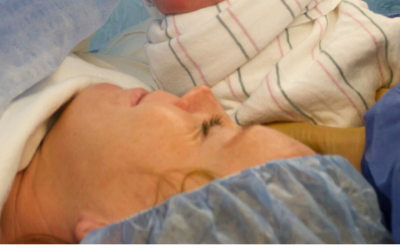
Is there a connection between hyperemesis gravidarum and preeclampsia?
Ask An Expert Question: Are hyperemesis gravidarum (HG) and preeclampsia related?
There appears to be a connection between hyperemesis gravidarum (HG) and preeclampsia, but that connection is not fully understood by researchers.
Hyperemesis gravidarum (HG), is severe and persistent nausea and vomiting in pregnancy that, unlike morning sickness, can last until delivery. It is not well understood, but does seem to be related somehow to preeclampsia.
What is hyperemesis gravidarum?
Hyperemesis gravidarum (HG), is severe and persistent nausea and vomiting in pregnancy that, unlike morning sickness, can last until delivery. HG occurs in 0.3-3% of all pregnancies and can be severe enough to affect cardiovascular and other organ functions. Research suggests that women who have HG are more likely to also experience preeclampsia. This does not, however, mean that every woman who gets HG will develop preeclampsia!
Of course, nausea and vomiting in the second half of pregnancy can also be a sign of preeclampsia and HELLP syndrome. It’s important to recognize that nausea and vomiting, no matter the cause, should be reported to your care provider.
What does the research say about HG and preeclampsia?
One of the largest population study to date looked at over 8 million pregnant women in England over fifteen years. The study assessed how often different pregnancy complications, including preeclampsia and HG, occurred. This study found that women with HG were slightly more likely to develop preeclampsia, and almost twice as likely to experience eclamptic seizures as women without hyperemesis. The results also found that hyperemesis gravidarum may be linked to a 16% greater likelihood of having preeclampsia and an 84% increased risk of eclampsia.
Understanding individual disease risk is complex. (See our article on “Understanding Risk Reduction versus Prevention.”) In a general human population, about 80 out of every 1,000 pregnant women would develop preeclampsia or a related condition. However, among 1,000 pregnant women with HG, you would see about 93 women who went on to develop preeclampsia. (The good news is that over 900 pregnant women with HG would not go on to have preeclampsia!)
The same logic can be applied to the risk of eclamptic seizures. If 12 out of 1000 average pregnant women develop eclampsia, you could expect to see 22 pregnant women out of 1,000 pregnant women with HG go on to experience eclampsia. So, while there is an association between HG and an increased risk of seizure, the relative risk remains low.
Another recent study from Canada looked at 1,413,166 pregnant women from Quebec who gave birth between 1989 and 2021 and followed them beyond pregnancy. About 1.2% of these pregnant women developed HG and 5.0% developed preeclampsia. Among the 17,391 women who experienced HG, 6.3% developed preeclampsia.
Does having HG make it more likely to have preterm preeclampsia?
According to another large population study from Sweden, HG that persists into the second trimester of pregnancy is associated with a two-times risk of preterm preeclampsia. Preterm preeclampsia occurs when preeclampsia is diagnosed prior to 37 weeks. This study looked at over one million pregnancies in Sweden over a 12-year period, and similarly counted the rate of pregnancy complications. Researchers found that women with second trimester HG were 3.16 times as likely to have preterm preeclampsia. This suggests that preterm preeclampsia (which happens in about 6 in every 1,000 pregnant women) increased to happening in 14 out of every 1,000 pregnant women with second trimester HG.
NOTE: It’s important to recognize that these large studies were conducted in Europe, and patients in the United States do not always look the same. Rates of preeclampsia and HG both may differ, as well as the likelihood of developing either or both conditions.
Why do we think there may be a connection between HG and preeclampsia?
The connection between HG and preeclampsia may be explained by the way our bodies change to grow the fetus and the placenta. While the exact cause of preeclampsia is unknown, research suggests that it starts as a failure of the placenta to implant and grow as it should. During pregnancy, the placenta’s role is to convince the mother’s body to tolerate being pregnant and give important nutrients to the growing fetus. The placenta decreases a pregnant woman’s immune responses to allow for shared resources. However, in preeclampsia and HG, the tolerance for that major change appears to be lower.
A major research study in 2023 led by Dr. Marlena Fejzo, found that high levels of the hormone GDF15 and increased sensitivity to it, are major factors contributing to HG. The study revealed that women who naturally had lower levels of GDF15 when not pregnant appear to be more likely to develop HG. GDF15 is produced at very high levels by the placenta in early pregnancy. Women with a genetic predisposition for lower levels before pregnancy become hypersensitive to the rapid rise of the hormone in early pregnancy.
The growth of the placenta and the fetus also requires changes to hormone levels. One of these hormones, serotonin, and its receptors appears to be elevated in both women who develop HG and women who develop preeclampsia. Serotonin is a hormone that the body naturally produces. Research suggests that during pregnancy, serotonin may play a role in the development of the fetal brain, the mother’s insulin resistance, and even help her immune system.
Women with hyperemesis have elevated blood levels of serotonin and women with preeclampsia have placentas that have more serotonin receptors than in normal pregnancy. These are changes that will be related to levels of sex-steroid hormones in pregnancy, like estrogen and progesterone, as well as to maternal anxiety. Since these factors are so central to normal pregnancy, it will take researchers more time to untangle how these relationships play out and what interventions could help to make our pregnancies more normal.
Recent meta-analyses have also suggested that in both preeclampsia and hyperemesis gravidarum there is more frequent infection with a gut bacterium called h.pylori, although these findings are relatively new and will need to be confirmed.
If you have nausea persisting into your second trimester (past 12 weeks of pregnancy) or changes in your anxiety (which can be related to serotonin levels), please talk to your care providers about these symptoms and ask if you should be more closely monitored for preeclampsia.
Are there long-term risks due to HG?
Remember the study of women in Quebec? That study’s primary purpose was to look at long-term risk of cardiovascular disease in women with HG. Researchers found that women who experienced both hyperemesis gravidarum and preeclampsia were more likely to have pre-existing underlying health conditions, pregnancies with multiples, and fetal congenital anomalies compared to those who did not have either condition. Furthermore, women with hyperemesis gravidarum tended to be socioeconomically disadvantaged, regardless of whether they also had preeclampsia. The prevalence of socioeconomic disadvantage was especially high among those with severe hyperemesis gravidarum.
Women who experienced both hyperemesis gravidarum and preeclampsia had the highest cumulative incidence of cardiovascular disease. After a follow-up period of 32 years, the cumulative incidence of cardiovascular events was reported as follows:
- 30.9 events per 100 women with both hyperemesis and preeclampsia,
- 28.2 events per 100 women with preeclampsia only,
- 17.7 events per 100 women with hyperemesis gravidarum only, and
- 14.0 events per 100 women with neither condition.
This suggests that HG, with or without preeclampsia, may also increase a woman’s risk for future cardiovascular disease.
Take away message:
Further research is needed on the connection between HG and preeclampsia. Women with HG have a greater chance of developing preeclampsia, eclampsia, and future cardiovascular disease. It is important to note that preeclampsia and HG may develop for similar reasons - not cause one another. If you have experienced preeclampsia and/or HG in a previous pregnancy, be sure to tell your obstetric provider.
Patients who are pregnant and have HG, should be sure to monitor signs and symptoms of preeclampsia and report any concerns to their care provider.
Finally, if you have experienced either or both of these conditions, follow up with your primary care provider to monitor your long-term heart health.
Editiorial note: this article was originally written in July 2019, and updated in May 2025 to include newer research studies on the cause and connection between HG and preeclampsia. Our thanks to the Preeclampsia Foundation Patient Advisory Council and the team at the HER Foundation for their review and suggestions on the 2025 update.
Related Articles

Your story is needed to improve outcomes for moms like you. Add your voice to critical preeclampsia research to ensure that every story is heard.

Frequently asked questions about the Preeclampsia Registry, a patient-driven registry and biobank.

The Preeclampsia Foundation offers research funding, study recruitment, and other patient engagement services to researchers.

We provide research grant funding to advance progress towards detection, prevention, or treatment of preeclampsia, HELLP syndrome, and other hypertensive disorders of pregnancy.

How does preeclampsia affect health after pregnancy? Preeclampsia doesn’t always end with delivery. It is now recognized as an early warning sign for future cardiovascular disease. Women who h...

Recent findings in preeclampsia research have shown that preeclampsia likely has at least two variants – an early onset and a late onset variant. Early onset is typically defined as before 34 we...

Preeclampsia is a pregnancy complication marked by new-onset high blood pressure and signs of stress on organs such as the kidneys, liver, and brain. While much attention is often given to preterm dis...

Preeclampsia is a serious problem that can happen during pregnancy. It often affects the brain and can cause headaches, vision problems, strong reflexes, and seizures (called eclampsia). In this study...

Pregnancy offers a unique window into a woman’s future heart and cardiovascular health. Conditions such as hypertensive disorders of pregnancy (HDP) which include gestational hypertension, preec...

